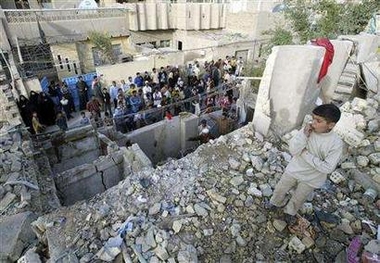|
Baghdad police find 80 bodies
(Reuters)
Updated: 2006-03-15 10:22
The bodies of at least 80 people apparently killed in sectarian attacks have
been found in Baghdad since early Monday, after more than 50 people died in
multiple car bombs in a Shi'ite militia stronghold.

An Iraqi boy stands
on a damaged house after a mortar attack in Baghdad, March 13, 2006.
[Reuters] | Discovered as Iraqi leaders failed to
break a deadlock on forming a unity government that might avert a bloodbath, the
dead included 29 found by a group of children playing soccer, and 15 strangled
men dumped in the back of a pickup truck.
The unusually high number of bodies for a short period -- many of them
bearing signs of torture -- followed Sunday's car bombs that struck Baghdad's
Sadr City, a stronghold of the radical Shi'ite cleric and militia leader,
Moqtada al-Sadr.
Sadr himself called publicly for restraint on Monday. But in Sadr City, the
bodies of men labeled "traitors" were hung from telegraph poles and officials
say privately that Shi'ite militia commanders are no longer all heeding clerical
appeals for calm.
Days of reprisals that killed hundreds after the February 22 bombing of a
Shi'ite shrine, prompted warning from officials, including the U.S. envoy, that
another large-scale attack could set off all-out sectarian conflict.
Many Sunnis had accused Sadr's Mehdi Army militia of being behind most of the
reprisals against Sunni homes and mosques sparked by the bomb of Samarra's
Golden Mosque.
Sadr, a rising kingmaker in the ruling Shi'ite Alliance, urged his followers
on Monday not to retaliate for the car bombs and has denied running death
squads.
The dumping of bodies tortured and killed execution-style has long been a
feature of Iraq's violence.
The number of such incidents has risen sharply since the Samarra bombing,
raising fears that the Shi'ite majority is abandoning restraint shown in the
past two years.
PLAYING SOCCER
Police dug up 29 unidentified bodies, most in underwear and with gunshot
wounds, in the Kamaliya district in southeast Baghdad after children playing
soccer smelled the corpses.
"They smelled something strong and the police were notified. They were buried
in one large pit," said a police official.
Some appeared to have been gagged, bound and tortured before being killed in
the past few days, police said. Others appeared to have been killed about a week
to 10 days ago.
Earlier, police found the bodies of 15 people bound and strangled in a
pick-up truck in mainly Sunni western Baghdad.
In addition, Baghdad hospitals received the bodies of 40 people killed in
separate incidents in Baghdad in the 24 hours since early Monday. A hospital
source said all had been shot.
Families on both sides of the sectarian divide give accounts of gunmen, some
in police and other uniforms, raiding homes and taking away relatives who are
later found tortured and killed.
In the first of a series of U.S.-backed marathon meetings, the four main
blocs in parliament held talks on Tuesday in the hope of reaching a deal on
forming a unity government.
President Jalal Talabani described talks between Shi'ite Islamists, Sunnis,
Kurds and secular leaders as "friendly."
PARLIAMENTARY BLOCS
Standing next to the heads of the four main blocs, Talabani said they had
agreed to form a committee to continue the talks: "We are walking toward forming
a government."
Secular Shi'ite Iyad Allawi, a former prime minister, was on the podium. He
has been little seen since his bloc performed poorly in the election. Viewed in
Washington as a non-sectarian, tough leader, some tip him for security chief in
a new cabinet.
Iraqi officials acknowledge in private they are running out of time and a
senior source in the main Sunni political group told Reuters: "Nobody is willing
to compromise."
U.S. President George W. Bush on Monday urged leaders to "reach out across
religious and sectarian lines." Sectarian strife has dented U.S. hopes of a
troop pullout soon.
"They're hoping to shake our resolve and make us retreat," Bush said of the
militants. "They're not going to succeed."
Three months after elections, leaders have yet to agree on who will lead the
government and fill other important posts.
Sunni Arabs and Kurds have rejected the Shi'ite Islamist United Alliance's
candidate for the premiership, interim Prime Minister Ibrahim al-Jaafari, who
they say has failed to revive a lacklustre economy and stem the growing
violence.
The Alliance, by far the largest bloc in parliament, says it will stick with
Jaafari and resist pressure to drop him.
Parliament's first session, set for March 16, is expected to remain
technically open for days, without adjourning, to give time for blocs to meet a
constitutional requirement to elect a speaker in the first session, officials
said.
Iraq's Interior Ministry announced a ban on driving in the capital to
coincide with the sitting.
Gunmen shot dead the editor of an Iraqi weekly near his home in Baghdad,
police and colleagues said on Tuesday, in the third killing of an Iraqi
journalist in a week.
|